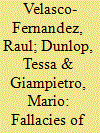| Srl | Item |
| 1 |
ID:
092784


|
|
|
|
|
| Publication |
2009.
|
| Summary/Abstract |
This paper applies the so-called Multi-Scale Integrated Analysis of Societal and Ecosystem Metabolism (MuSIASEM), based on Georgescu-Roegen's fund-flow model, to the Spanish region of Catalonia. It arrives to the conclusion that within the context of the end of cheap oil, the current development model of the Catalan economy, based on the growth of low-productivity sectors such as services and construction, must be changed. The change is needed not only because of the increasing scarcity of affordable energy and the increasing environmental impact of present development, but also because of the aging population. Moreover, the situation experienced by Catalonia is similar to that of other European countries and many other developed countries. This implies that we can expect a wave of major structural changes in the economy of developed countries worldwide. To make things more challenging, according to current trends, the energy intensity and exosomatic energy metabolism of Catalonia will keep increasing in the near future. To avoid a reduction in the standard of living of Catalans due to a reduction in the available energy it is important that the Government of Catalonia implement major adjustments and conservation efforts in both the household and paid-work sectors.
|
|
|
|
|
|
|
|
|
|
|
|
|
|
|
|
| 2 |
ID:
171388


|
|
|
|
|
| Summary/Abstract |
The strategy of energy efficiency to save energy is deceptively simple: the idea is to use less input for the highest amount of useful output. However, on a practical and conceptual level, efficiency is an ambiguous and problematic concept to implement. Of particular concern is the lack of contextual and qualitative information provided in energy efficiency measurements based on simple ratios. Oversimplification of efficiency measurements can have a detrimental effect on the choice of energy policies. Efficiency measurements are particularly problematic on a macroeconomic scale where a significant amount of meaningful information is lost through the aggregation of data into a simple ratio (economic energy intensity). First, practical examples are presented flagging conceptual problems with energy efficiency indicators, then an alternative accounting method—the end-use matrix—based on the concept of the metabolic pattern of social-ecological systems is illustrated to show the possibility of enriching efficiency indicators by adding qualitative and contextual information across multiple scales and dimensions. This method unpacks and structures salient energy input and output information in a meaningful and transparent way by generating a rich multi-level and multi-dimensional information space.
|
|
|
|
|
|
|
|
|
|
|
|
|
|
|
|